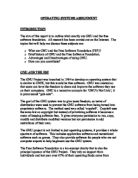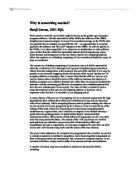The Free Software Foundation is a tax-exempt charity that is also the principal sponsor of the GNU Project. They rely on support from individuals and last year over 67% of their operating funds came from individual donors rather than money from corporations or grant-making foundations. The FSF’s mission is:
“to preserve, protect and promote the freedom to use, study, copy, modify, and redistribute computer software, and to defend the rights of Free Software users” ()
The FSF also obtains income through sales, of copies of free software and of other related services. It sells CD-ROMs of source code, CD-ROMs with binaries, printed manuals and Deluxe Distributions (which are custom built collections of software made for the customer’s choice of platform). The FSF is dedicated to promoting computer users’ rights. They promote the development and use of ‘free software’ and ‘free documentation’. They also help to spread awareness of ethical and political issues of freedom in the use of software. In contrast to other organisations the FSF concentrates on development of new free software and on making that software into a logical system which can eradicate the need to use proprietary software.
The term ‘free software’ is more a matter of liberty and not price. It is more a reference to freedom. It refers to four kinds of freedom:
- “The freedom to run the program, for any purpose.”
- “The freedom to study how the program works, and adapt it to your needs. Access to the source code is a precondition for this.”
- “The freedom to redistribute copies so you can help your neighbor.”
-
“The freedom to improve the program, and release your improvements to the public, so that the whole community benefits. Access to the source code is a precondition for this.” ()
A program is free software if users have all these freedoms. This means that anyone is able to redistribute copies, with or without modifications, for free or for a fee to anyone anywhere.
HISTORY
The GNU project was conceived in 1983, it was thought of as a way of bringing back the cooperative spirit that prevailed in the early days of the computing industry. This was done by removing the barriers provided by the owners of proprietary software.
In 1971 a man called Richard Stallman who worked at MIT artificial intelligence lab became part of a software sharing community. If someone was seen using an unfamiliar or interesting program people could obtain the source code used. This meant that they could read it, change it or use parts of it to make a new program. This situation changed in the early 80’s as the community collapsed due to technological changes. Almost all software was then proprietary which meant the owners forbid and prevented cooperation by users. This is what made the GNU project necessary. As every computer needs an operating system you could not even get started without using a proprietary operating system. As an operating system developer he had the right skills for the job. As an operating system is not just a kernel but is also a compiler, editor, text formatter and many other things, writing such a program was an enormous task. In January 1984 Richard quit his job and began writing the GNU software. It took a number of years to produce. The first project was to create a multi-language, multi-platform compiler, after a number of failed attempts at adopting other people’s source codes Richard made one from scratch, this new compiler is now known as GCC, although firstly he worked on GNU emacs in September 1984. People then began requesting to use GNU emacs which helped him make some money. As interest in this grew other people became involved in the project prompting the decision to seek more funding. The Free Software Foundation was created and took over the distribution of the Emac tapes.
The decision to make it compatible with UNIX was made because the overall design was already proven and made it easier for users to swap from UNIX to GNU. Even if it had no technological advantages over UNIX it would have a social advantage allowing users to cooperate.
He used existing pieces of free software wherever it was possible such as using TeX as the principal text formatter. By the 1990’s all the major components had been written except for the kernel. Then Linux which was a free kernel was developed by Linus Torvalds. Combining this with the almost complete GNU system resulted in a complete Linux based operating system. Estimates claim that hundreds of thousands of people now use the Linux-based GNU systems.
PROS AND CONS
There are a number of pros and cons to using the GNU operating system, some are listed below:
Pros
- It’s free!
- It’s built to survive.
- It’s very stable.
- It’s extensible.
- It’s compatible.
- Easy to install.
- Choice of Graphical User Interfaces.
Cons
- Limited software selection compared to systems such as Windows.
- Learning how to use it.
- Converting from old system can be difficult.
HOW TO CONTRIBUTE
There are numerous ways in which anyone can help the GNU project and the Free Software Foundation. You can help in announcing what’s going on in free software around the world by writing or translating documents. Also help translate their WebPages into various other languages. Help maintain GNU packages, and also write, evaluate and use free software. Help write documentation for GNU software. Spread the word about the GNU project and the Free Software Foundation by informing your friends about them and also stress the importance of freedom and community. The most obvious way to help the organisations would be to make a donation to the FSF, or order manuals, T-Shirts and CD-ROMS. If not buying them personally convince others to do so. Selling free software and donating a part of the profits to the FSF would also be a great contribution in helping the development. If you or your company work supporting or developing free software in some way, you can list yourself or the company in the ‘GNU Service Directory’. Donations of other things such as hardware or office supplies are another very useful way to help this project. There are another number of ways to help, these ideas and where to contact if so wished are listed on .







